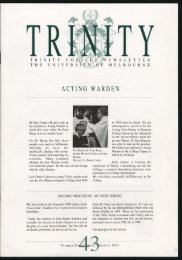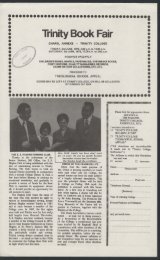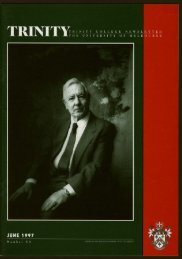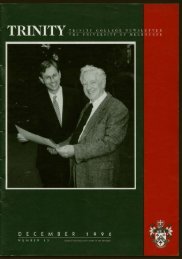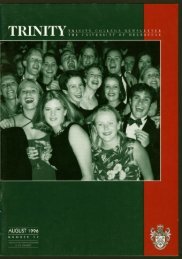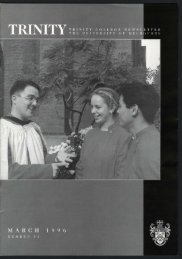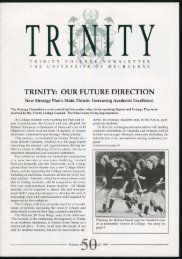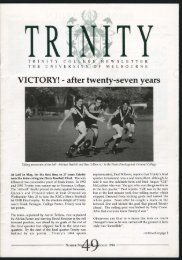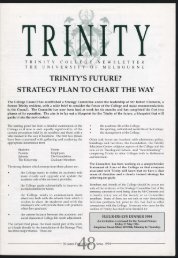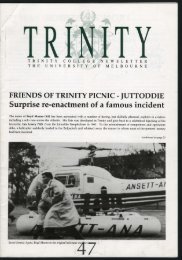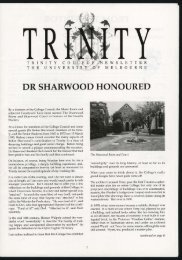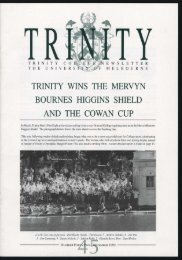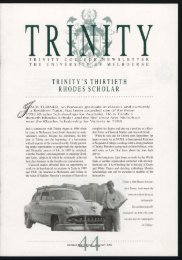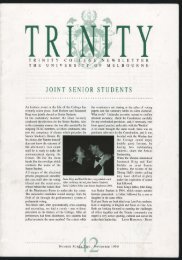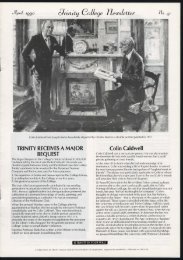Trinity College Newsletter, vol 1 no 26, December 1984
You also want an ePaper? Increase the reach of your titles
YUMPU automatically turns print PDFs into web optimized ePapers that Google loves.
~ ~ ~`• 1~; —<br />
. .. .. .. _~.r•-w•~<br />
•k,.arG<br />
+~A<br />
.w .. . ~. ~ ,y~,e•tc<br />
,~•. .... ........:'~:.~ ~:.<br />
-<br />
<strong>Trinity</strong> <strong>College</strong> and part of the University as seen from the air in the early 1920's.<br />
WITHDRAWAL OF GOVERNMENT SUPPORT FOR COLLEGES<br />
All Government support for <strong>College</strong>s will cease by the end of<br />
1986. Each year it will be diminished by a further 25% from the<br />
1983 level. There will be <strong>no</strong> indexation for inflation and<br />
cost-of-living. For <strong>Trinity</strong>, this means the progressive loss of<br />
$72,000 each year for the annual budget. This can only be<br />
recouped by increasing student fees, probably to $130 per week<br />
next year.<br />
Things have declined alarmingly since the Murray Report in the<br />
early 1960's recommended substantial help for <strong>College</strong>s with both<br />
capital grants and annual per capita grants. The Report, accepted<br />
by the Menzies Government and its successors, affirmed the<br />
value to students, and to the community generally, of collegiate<br />
living. The per capita grant was to provide assistance for students,<br />
especially in their first year, by way of tutorials and pastoral<br />
care.<br />
Capital grants for approved projects were usually on a matching<br />
basis, and enabled <strong>College</strong>s to maintain and re<strong>no</strong>vate ageing<br />
buildings and to bring kitchens, bathrooms and roofs up to an<br />
acceptable standard. These grants were suddenly cut off in 1975<br />
and there is <strong>no</strong> likelihood of their being reinstated.<br />
The removal of all grants means that the Government <strong>no</strong> longer<br />
sees <strong>College</strong>s as a vital part of the educational life of the nation. In<br />
<strong>Trinity</strong> we are committed to a heritage, the value of which has<br />
been proven over centuries. We shall <strong>no</strong>t allow ourselves to<br />
become a mere boarding house. We are determined to pursue<br />
excellence and the fullness of a true collegiate life.<br />
In August, a representative meeting of Heads of <strong>College</strong>s and<br />
Halls of Residence from across the nation adopted the following<br />
statement:<br />
A PUBLICATION OF TRINITY COLLEGE WITHIN THE UNIVERSITY OF MELBOURNE<br />
Registered by Australia Post — Publication No. VBG 4336<br />
SENATOR RYAN AND STUDENT RESIDENCES<br />
The Heads of <strong>College</strong>s and Halls of Residence wish to affirm that<br />
they are in sympathy with the stated policy of the Government of<br />
greater participation in higher education, especially by<br />
disadvantaged groups such as those who live in rural and<br />
outer-metropolitan areas. However, they are severely critical of<br />
some of the decisions to this end taken by Senator Ryan, the<br />
Minister for Education and Youth Affairs, especially those relating<br />
to students in Residential <strong>College</strong>s and Halls.<br />
In August 1983, without consultation with the Universities<br />
Council, Senator Ryan an<strong>no</strong>unced a 25 per cent cut in the<br />
Recurrent Grant to University Residential <strong>College</strong>s and Halls. She<br />
seemed to be unaware that the burden of this cut would fall on the<br />
80 per cent or more of the residents of these <strong>College</strong>s and Halls<br />
who have to live away from home in order to pursue a tertiary<br />
education. Moreover, the grant is to meet the costs of services,<br />
such as tuition and counselling, which these students need to help<br />
them to make the adjustment from country to city, and from<br />
school to university.<br />
The cut will therefore be counter-productive to the<br />
Government's policy; it both threatens access of rural students to<br />
tertiary education by increasing the financial burden, and also<br />
threatens the support services so necessary to their success.<br />
Since August 1983, the Heads have repeatedly sought an<br />
opportunity to discuss these matters with the Minister, but she has<br />
consistently refused to speak with them. The Universities Council<br />
also warned the Minister, in its report for the 1982-84 triennium:<br />
"The Council is concerned that the effect of this (cut) could be<br />
that fees will rise thus imposing an increased financial burden on
students from <strong>no</strong>n-metropolitan backgrounds who constitute the<br />
majority of residents".<br />
Following the an<strong>no</strong>uncement of the cut the Minister continued on<br />
her unheeding way until 5th July, <strong>1984</strong>, when, in her press release,<br />
she an<strong>no</strong>unced that the Recurrent Grant would be phased out<br />
completely by the end of 1986, and that it would be replaced by a<br />
scheme of loans and grants to students, whether they were in<br />
residence or <strong>no</strong>t. She prefaced this by the very misleading<br />
statement that "The Government accepts the Commission's<br />
advice". The Commission's advice was quite otherwise - that an<br />
amount equal to the Recurrent Grant should be made available to<br />
the Heads of <strong>College</strong>s and Halls for grants to needy students in<br />
residence to help them meet the cost of accommodation, an<br />
amount which could be effectively used for the limited number of<br />
students in residence. Instead, the Minister is asking the<br />
Universities to set up costly administrative structures to lend a<br />
relatively small amount to a vast number of students with the<br />
probable outcome that <strong>no</strong>-one will benefit.<br />
Cumbrous loan procedures will <strong>no</strong>t promote the Government's<br />
policy to increase participation in tertiary education by rural and<br />
outer-metropolitan students; <strong>no</strong>r is the 10 per cent increase in<br />
TEAS an adequate response.<br />
There is <strong>no</strong> readily available substitute for the support services<br />
provided by the <strong>College</strong>s and Halls for these students, and the<br />
Government should continue to finance them. At the same time,<br />
if it is really serious about giving opportunities for increased<br />
participation to these students, it should introduce an adequate<br />
living allowance, without means test, for all students who have to<br />
live away from home in order to pursue a tertiary education.<br />
For <strong>Trinity</strong>'s survival as a true <strong>College</strong>, the <strong>Trinity</strong> <strong>College</strong><br />
Foundation is <strong>no</strong>w more important than ever. Major re<strong>no</strong>vation of<br />
buildings to meet modern standards must <strong>no</strong>w be funded by those<br />
who care for the <strong>College</strong>. Funds must be found to enable good<br />
students, who would <strong>no</strong>t otherwise afford to come, to share in the<br />
benefits of Collegiate life.<br />
EVAN L. BURGE<br />
WARDEN<br />
A TRINITY OF INTERNATIONAL DINNERS<br />
The Warden, who is at present on leave at Selwyn <strong>College</strong><br />
Cambridge as a Fellow Commoner (one who has all the rights of a<br />
Fellow except voting rights) recently managed to attend three<br />
Fleur-de-Lys dinners in almost as many weeks and on different<br />
sides of the world!<br />
The evening before his departure for the United Kingdom Dr<br />
Burge attended the Sydney Fleur-de-Lys dinner organised again<br />
this year by Brigadier John McDonagh ('49).<br />
Then it was off to London where the Warden brought back<br />
memories of <strong>College</strong> life to the 22 <strong>Trinity</strong> members at a dinner<br />
held at the Duke's Hotel in St James Square and organized by<br />
David Emmerson ('59) who is with Mobil Oil. Among the guests<br />
was Mr Robert Cripps who happened to be in London on business<br />
at the time.<br />
Ten days later the Warden flew across the Atlantic to attend the<br />
New York Dinner organized by Phillip Cohen ('66) and his wife Jill.<br />
Amongst the guests were Chris Dunstan ('76), Jack Cohen ('52),<br />
Mary Perrett ('79), David O'Callaghan ('80), Fred Grimwade ('76),<br />
and Ed Billson ('78).<br />
The Warden was delighted to be able to catch up with so many<br />
former residents on such happy occasions, and we look forward to<br />
his return in January.<br />
FOR YOUR DIARY<br />
Fleur-de-Lys Dinner 1985<br />
Next year the Annual Fleur-de-Lys Dinner will be held in<br />
June and <strong>no</strong>t in February.<br />
It will take place on Friday 14th June 1985 and be held in the<br />
<strong>College</strong> Dining Hall.<br />
TRINITY<br />
THE GREAT BANQUET HALL<br />
At the <strong>1984</strong> Valedictory Dinner Dr John Gaden, Director of the<br />
<strong>Trinity</strong> Theological School proposed the toast to the Valedictees<br />
and likened <strong>Trinity</strong> to the great banqueting hall depicted in Bede's<br />
Anglo Saxon story:—<br />
"When we compare the present life of man on earth with that time<br />
of which we have <strong>no</strong> k<strong>no</strong>wledge, it seems to me like the swift flight<br />
of a single sparrow through the banqueting-hall where you are<br />
sitting at dinner on a winter's day with your thanes and<br />
counsellors. In the midst there is a comforting fire to warm the hall;<br />
outside, the storms of winter rain or s<strong>no</strong>w are raging. This sparrow<br />
flies swiftly in through one door of the hall, and out through<br />
a<strong>no</strong>ther. While he is inside, he is safe from the winter storms; but<br />
after a few moments of comfort, he vanishes from sight into the<br />
wintry world from which he came. Even so, man appears on earth<br />
for a little while; but of what went before this life or of what<br />
follows, we k<strong>no</strong>w <strong>no</strong>thing.<br />
<strong>Trinity</strong> is like the great banquet hall and you are the sparrows<br />
flitting through for a while. There is King Evan, with his trusty<br />
Thanes—Mike, Frank, Tom and Mustapha, wise<br />
2<br />
Counsellors—Arthur the chief one, Bryan, Peter and the Tutors,<br />
attractive retinue—Susan, Marie, Lisa and Joyce, and, if you<br />
pardon the expressions, his Churls—Sally and Louise.<br />
What King Evan and his company remember is the flight of the<br />
sparrows as they pass from the elegance of Chicken and<br />
Champagne Breakfast on the Bulpadock in 0' Week to this more<br />
sordid Dinner, punctuated by some jousting and battle games,<br />
St Joan, and the Mikado. But little things stick out as well—Alison<br />
the sun-lover and Bruce the dark-room pounder, the more<br />
<strong>no</strong>table thrusts of Andrew the great strider and Alistair the Barman,<br />
or the quieter touches of Samantha the dancing gazelle and<br />
Brecon the window-cleaning crooner, and many others. All of you<br />
in the 60 or so valedicting this year one could mention. As you go<br />
winging on your way, we thank you for your company and the<br />
pleasure of your flight, and these memories that you leave<br />
behind.<br />
And as you go,<br />
Live creatively<br />
Fly strongly, and<br />
May you find a good place in which to nest ..."
WE NEED YOUR HELP<br />
The <strong>Trinity</strong> <strong>College</strong> Foundation has <strong>no</strong>w reached $850,000<br />
in pledges and it is the ambition of the Executive Committee<br />
to reach its initial target of $1.5 million at the earliest possible<br />
date.<br />
The success of the Foundation is vital to <strong>Trinity</strong>'s survival and<br />
development and every <strong>College</strong> member is urged to<br />
become a member of the <strong>Trinity</strong> <strong>College</strong> Foundation. Only<br />
with your support will the Foundation reach its eventual goal<br />
of $6 million.<br />
If you have <strong>no</strong>t already been approached but feel you would<br />
like to help in some way you are invited to contact the<br />
Chairman, Mr John Gourlay or the Executive Officer, Miss<br />
Angela Mackie at the <strong>College</strong> Tel: 3471044.<br />
Do<strong>no</strong>rs to the Foundation are designated for life as<br />
follows:<br />
Gover<strong>no</strong>r<br />
Patron<br />
Sponsor<br />
Member<br />
Payments may be spread over a five year period and all<br />
donations are fully tax-deductible.<br />
PLEASE SUPPORT THE OLD COLL.<br />
$25,000<br />
$10,000<br />
$ 5,000<br />
$ 2,000<br />
Various members of the Executive Committee of the Foundation discuss progress to date.<br />
From left to right: Mr Arthur Day, Miss Angela Mackie (Executive Officer), Dr Evan Burge (Warden), Mr John Gourlay (Chairman), Mr Clive Smith<br />
(Vice-Chairman), Mr David Wells (Hon. Secretary).<br />
3
RESTING FROM 'BEING RELEVANT'<br />
(Reprinted with kind permission from Church Scene)<br />
"Give us a TRINITY; Tiger Wh000000000... For God," cries<br />
Vicar!<br />
"Seems to be more young Geoffrey Chaucer's idea of what a<br />
pilgrimage ought to be than Bunyan J's", observed Bendigo's<br />
Bishop Oliver Heyward, eyeing the happy band of 500-plus<br />
pilgrims from the safety of his cathedral pulpit.<br />
K<strong>no</strong>wing that Christ's pilgrim people need to keep on the move if<br />
they're going to achieve the good things of God's Kingdom,<br />
Archbishop David Penman, mitre on head and metropolitical<br />
Cross at ease, gallantly shepherded his nuns, priests, and assorted<br />
Wives of Bath aboard Vicrail's fast, efficient STEAM.<br />
And thus, for the third consecutive year, <strong>Trinity</strong> <strong>College</strong> and their<br />
fellow-travellers were back on the rails again last Saturday. Issued<br />
with ration boxes containing rum truffles, coconut ice and gooey<br />
fudge the pilgrims of <strong>1984</strong> went forth in quest of ... Bendigo!<br />
Banners fluttering in the clouds of incense, the pilgrims marched<br />
through the streets of the city to the skirl of pipe and drum ...<br />
Fast, efficient Vicsteam proving more stately than expected;<br />
solemn mass at St. Paul's Cathedral concluded with a late<br />
after<strong>no</strong>on feast of cider and roast ox washed down with a full<br />
half-acre of the very best sort of rich country puddings from the<br />
kitchens of the ABM Women's Auxiliary. Eating was to the tune of<br />
the local Irish orchestra.<br />
Neither was the intellectual aspect of the day's festivities<br />
neglected. Luncheon on the cathedral lawns led inevitably to<br />
readings from "Winnie the Pooh"; Fr Geoffrey Taylor acquitting<br />
himself admirably as a bear of very little brain, and Theological<br />
School Director, John Gaden, giving a whole new meaning to the<br />
subtle nuances of the role of Piglet.<br />
In his homily, Bishop Heyward reminded the packed<br />
congregation of the great cloud of witnesses; saints of our own<br />
time and the past who support and encourage the followers of<br />
Jesus on our journey.<br />
Inevitably Christians will discover a solidarity with the wanderers<br />
of the world, with the lost and the homeless, said the Bishop. Even<br />
The pilgrims make their way to St. Paul's Cathedral.<br />
as we share most intimately in the world's despair we draw<br />
strength from the k<strong>no</strong>wledge that we have a leader, we have<br />
confidence in the goal towards which we press, and we are<br />
encouraged in the hope which has been planted in our hearts.<br />
Gathering to share in the eucharist we receive a taste of the reality<br />
of God's Kingdom. This treasure we must take back to share with<br />
our friends and neighbours.<br />
Chugging along home the general verdict was that this had been<br />
the best <strong>Trinity</strong> Pilgrimage yet. We had set out expecting to do our<br />
bit financially to support the expansion of Victoria's Provincial<br />
Theological School at <strong>Trinity</strong> <strong>College</strong>.<br />
Organisers John Davis and Pamela Oddy saw to it that we did!<br />
<strong>Trinity</strong> fulfils a a unique role amongst Australian theological<br />
colleges by preparing men and women for ministry in community<br />
with future leaders in other aspects of the country's life.<br />
By journey's end the pilgrims found they had done rather more<br />
than just raising a couple of thousand dollars. Concluded Altona's<br />
Fr Noel Whale; "The value of an event like today's is that it brings<br />
together people from all around the diocese. We get to share our<br />
hopes and joys and difficulties; we discover we are <strong>no</strong>t the only<br />
Christian, <strong>no</strong>t the only congregation in the world. We look around<br />
and see how many of us we are and how good it is."<br />
Like Chaucer said—on a gloriously hot Spring day Christians are<br />
allowed to shrug off their soul-searching and set forth to celebrate<br />
together.<br />
So, this is the story of how, one October day, a band of Melbourne<br />
Anglicans took a holiday from "being relevant", and stewardship<br />
campaigns, women priests, and Bishop Jenkins, to wave the flag a<br />
bit and say "Thank you Lord for ...<br />
*<strong>Trinity</strong> <strong>College</strong><br />
*The pastors he has given us (well, with some reservations)<br />
*The fun to be had in following Jesus<br />
*How good it is for Christians to get together."<br />
'In cognito', the Rev. Christopher Seton, the Rev. Andrew St. John and the<br />
Rev. Noel Whale looking splendid.<br />
CHRISTOPHER SETON<br />
4
HUMANITARIAN 'TAFFY' JONES WINS V.E.F. COMMUNITY<br />
SERVICE AWARD<br />
There are few people who have earned the<br />
right to be described as humanitarian, but in<br />
the case of Dr. Michael Jones (or Taffy to all<br />
who k<strong>no</strong>w him) he certainly fits that<br />
definition of one who seeks to promote<br />
human welfare.<br />
And it is that on-going desire to promote<br />
human welfare that has earned Taffy Jones<br />
the Victorian Employers' Federation's<br />
Community Service Award for <strong>1984</strong>.<br />
Dr. Jones was <strong>no</strong>minated for the annual<br />
Award by the Geelong City Council for his<br />
wide ranging activities associated with caring<br />
for the needs of many of Geelong's<br />
<strong>no</strong>t-so-fortunate citizens.<br />
Professionally, Dr. Jones is the Director of<br />
Medical Services at the Geelong Hospital,<br />
but his extensive community activities tell far<br />
more about this humanitarian than his job<br />
title.<br />
Dr. Jones' interest in promoting human<br />
welfare has extended outside the hospital<br />
and has virtually covered our whole life<br />
span.<br />
For example, as Chairman of the Barwon<br />
Regional Consultative Committee, he<br />
identified the social issues causing most<br />
concern to the region—the special needs of<br />
adolescents living in isolation and loneliness,<br />
unemployed youth, support for those<br />
confronted with unemployment.<br />
He set up an Adolescent Task Force and Emergency Aid Task Force,<br />
he also helped establish a Rape Crisis Centre and was instrumental<br />
in finding funds for the Geelong Women's Refuge.<br />
He has also helped others like single mothers, wards of the State<br />
and parolees, as well as borderline mentally deficient children.<br />
Dr. Jones also established the Geelong Hospice Care Association<br />
which provides for the terminally ill their wish to die in their own<br />
home in familiar surroundings rather than in a cold, clinical<br />
hospital.<br />
The winner of this year's Community Service Award, Dr. Michael 'Taffy'Jones is congratulated by the<br />
President of the Victorian Employers' Federation, Mr. Ken McGregor (left) and the Lord Mayor of<br />
Melbourne, Cr. Eddie Beecham (right).<br />
Dr. Jones, 45, was born in Geelong but practised in Melbourne,<br />
Deniliquin, Mansfield and Hobart.<br />
He returned to Geelong in 1975 to take up the position of Deputy<br />
Director of Medical Services and was appointed Director in<br />
1980.<br />
Dr. Jones received his Community Service Award from the Lord<br />
Mayor of Melbourne, Cr. Eddie Beecham, at a recent ceremony at<br />
the Melbourne Town Hall.<br />
Reprinted with the kind permission of the Victorian Employers' Federation.<br />
VALEDICTORY DINNER <strong>1984</strong><br />
The address at the Valedictory Dinner was given by Mr Peter<br />
Mitchell (1956) of the Moonie Oil Company Limited. In his<br />
introduction, Mr Mitchell <strong>no</strong>ted that his intention was to<br />
challenge his audience and provoke a reaction. This he certainly<br />
did! Mr Mitchell's remarks are reproduced here:<br />
<strong>Trinity</strong> is a college with a great religious tradition, so I thought a few<br />
remarks on the great Australian religions might be appropriate.<br />
There is of course the ecclesiastical religion—a brief check on<br />
chapel attendance records tells me that you are all expert at this<br />
religious form.<br />
Then there is Hedonism, a religion much practised by the rich of<br />
all ages and many otherwise idle souls lost in the <strong>no</strong>-mans land<br />
between school and marriage and/or a career.<br />
Hedonism is the doctrine that pleasure is the chief good.<br />
In its simple form, Hedonism presents the perfect life. Totally<br />
uncomplicated beyond the immediate problems of avoiding dull<br />
people, dull places, after dinner speakers and of course, most<br />
college wines.<br />
It can become complicated if one's pleasure palate grows bored.<br />
Clearly it is probably then time to seek a<strong>no</strong>ther religion.<br />
Hedonism only becomes dangerous to our community when we<br />
seek to superficially satisfy and gratify our need for moral pleasure<br />
or comfort.<br />
Here there is the danger that we seize on simply stated and<br />
obvious moral truths and needs, for example, high social<br />
spending, taxing the successful, land rights, immigration for all, the<br />
environment, uranium, and last but <strong>no</strong>t least, full pensions for<br />
anyone who stays in <strong>Trinity</strong> beyond a second year; and, luxuriating<br />
in a warm wash of moral rectitude, we fall mindlessly for the values<br />
established by our often breathlessly indignant and deep, deep<br />
thinking current affairs programmers.<br />
I only want to say for each Hedonistic moral issue there is a cost,<br />
and often a massive and permanent cost to our society, and you,<br />
the future generation, must <strong>no</strong>t blindly accept media established<br />
morality.<br />
So to the moral hedonists please, think, and read, and make up<br />
your own minds—and slowly.<br />
It is quite foolish for me to speak to you of hedonism. Close<br />
observation of certain un-named members of the <strong>College</strong> have<br />
convinced me that there are several professors of this theology<br />
currently in residence and masquerading as students.<br />
For those hedonistic palates that pall, there is always materialism.<br />
Clearly one of the most superficially satisfying of all religions.<br />
A lifetime of dedication is quite possible, the rewards endless but,<br />
I suggest for some of you, endlessly unsatisfying.<br />
Finally there is a fourth set of beliefs.<br />
So unfashionable that its few remaining adherents are neanderthal<br />
outcasts and pariahs. I only dare mention this because my remarks<br />
purport to be a brief but global look at Australian religions, and this<br />
set of beliefs did play a large part in our history.<br />
i have great diffidence and embarrassment in listing some of these<br />
beliefs and beg that you do <strong>no</strong>t attribute (outside of this Hall) any<br />
of them to me. They include:<br />
Australia is an outstanding country.<br />
The Australian is gutsy, hard-working, loyal, trustworthy and<br />
fair-minded. - (cont. on P-6.)<br />
5
CLOSING COMMENTS FROM PETER BENNIE<br />
By CHRISTOPHER DAWSON<br />
The Rev. Peter Bennie, Warden of St. Paul's <strong>College</strong>, Sydney—Picture: BOB FINL4YSON<br />
His memorial already appears on the roof of St Paul's <strong>College</strong>,<br />
Sydney University, in the form of sculptured toads.<br />
For years students have referred to their Warden, the Rev Peter<br />
Bennie, as Toad of Toad Hall. He admits the affectionate<br />
sobriquet sprang from a distant likeness to a Queensland cane<br />
toad.<br />
One enterprising Pauline cemented the figures high above the<br />
Gothic courts.<br />
Mr Bennie will soon retire, but the toads will remain.<br />
The college union is giving him a farewell dinner on Saturday<br />
although he will stay as Warden until his 70th birthday in<br />
February.<br />
For more than 20 years he has presided over Australia's oldest and<br />
most traditional university college.<br />
Eton and <strong>Trinity</strong> <strong>College</strong>, Cambridge, might be the desirable<br />
progression for Britain's social elite, but in NSW the preferred<br />
course is a Greater Public School of an Anglican foundation<br />
followed by St Paul's.<br />
This is the college of Whitlam and McMahon which has nurtured<br />
many of Australia's lawyers, captains of industry and men of<br />
commerce. It has remained single-sex (90 per cent of students<br />
voted against admitting women), stylish, sports-oriented,<br />
academically distinguished and socially attractive.<br />
St Paul's was created by an Act of Parliament in 1854, the year the<br />
university was founded, and has remained a corner of calm away<br />
from the clamour of the main campus.<br />
In 20 years, Mr Bennie says, he has seen little change in student<br />
attitudes, except during the Vietnam War years. Students today<br />
have reverted to what they were like in 1963, he says.<br />
Mr Bennie has encouraged the enrolment of a large number of<br />
postgraduates in the college on the basis that "too many<br />
youngsters straight from school means too much <strong>no</strong>ise".<br />
Not surprisingly, he is very much against the Federal<br />
Government's decision to phase out recurrent grants to<br />
residential colleges and reserves some of his strongest criticism for<br />
the Minister for Education and Youth Affairs, Senator Ryan.<br />
"What they want to do is to spend the money on "disadvantaged<br />
students" ... what the Government will succeed in doing is<br />
crushing some student residences and making others more<br />
exclusive," he says.<br />
Commenting on this decision, Mr Bennie said: "This Government<br />
is entirely Philistine. I think it is ideological. As soon as the Prime<br />
Minister gets rid of his Minister for Education the better. It could<br />
<strong>no</strong>t get worse.<br />
"What you want is somebody who looks at the facts, <strong>no</strong>t an<br />
ideologue. She gets the direct opposite result from what she<br />
thinks she intends to do."<br />
He says it should be <strong>no</strong> surprise that the scholastic standard of the<br />
college is higher than the university. "If you live on campus and<br />
don't have to commute you have a chance to study," he says. "It<br />
would be very disgraceful if we were <strong>no</strong>t above the average.<br />
"We also have a tutorial system which offsets the vast numbers of<br />
people at university. If you have a tutorial class of eight people<br />
who k<strong>no</strong>w their tutor then you have e<strong>no</strong>rmous advantages."<br />
Mr Bennie shared a similar background to most of his charges. He<br />
is an old boy of Scotch <strong>College</strong>, Melbourne, and of <strong>Trinity</strong> <strong>College</strong><br />
at Melbourne University.<br />
Reprinted with the kind permission of 'The Australian'<br />
Our society has been built on opportunity, and hard work<br />
and continuity of these conditions is required to keep our<br />
society safe, just and prospering.<br />
The rights of the individual are fundamental.<br />
You can see why this, if I may call it, nationalistic religion is so<br />
unpopular. Governments of both persuasions have quite<br />
correctly perceived these tenets as unnecessarily restrictive and<br />
are progressively undermining these beliefs and reducing our<br />
freedoms.<br />
The freedom of work for many people is severely restricted by<br />
union closed shop tactics, legal secondary boycotts, artificially<br />
high wages and a raft of government regulations rigidly imposed<br />
by a mindless and massive bureaucracy.<br />
The right to choose a form of education is seriously impaired by<br />
confusion over funding and the determined destruction of<br />
educational standards by some powerful teachers'<br />
organisations.<br />
VALEDICTORY DINNER (Continued)<br />
6<br />
The right to change our social and cultural make-up has been<br />
arrogated by a government who claim because it was<br />
democratically elected that it has a 'mandate' to do specific things.<br />
Semantic <strong>no</strong>nsense.<br />
There are other examples. It is hard to cause Governments to<br />
change direction, particularly if your religion has too few disciples.<br />
It was <strong>no</strong>t ever thus.<br />
Your great-great grandfathers thought that this country gave them<br />
an opportunity, free from the shackles, prejudice and favours of<br />
19th Century European society, to establish a free and<br />
independent way of life and a particular Australian ethos.<br />
They battled the bush, the alien soil, the worst that nature could<br />
deal them, and they built country, an eco<strong>no</strong>my, and, considering<br />
the starting point, a great society.<br />
Many of your great grandfathers fought a bloody war on an ideal,<br />
forcing themselves up the scrubby heights of Gallipoli into the<br />
(continued on page 8)
THIRST FOR KNOWLEDGE<br />
Australian wines and how to enjoy them<br />
Jeremy Oliver (1979) former resident of <strong>Trinity</strong> and son of former<br />
chaplain, the Reverend Rodney Oliver, has just completed a<br />
splendid book on Australian wines and how to enjoy them. This<br />
handsome <strong>vol</strong>ume has been delightfully illustrated by Tim<br />
Lindsay (1981) a current student at <strong>Trinity</strong>.<br />
THIRST FOR KNOWLEDGE takes the reader through a<br />
crash-course in viticulture and winemaking, Australian wine<br />
history (From Convicts to Con<strong>no</strong>isseurs), wine tasting and our<br />
local wine styles. It passes through the wine areas, wine labels,<br />
wine and food, and has a chapter written to help the individual<br />
find out which wines he or she may prefer.<br />
Other chapters deal with cellaring and serving wine, cask wine, a<br />
few wine reviews, and how to drink wine safely from a medical<br />
point of view (I Shouldn't Have Had That Last Flagon).<br />
THIRST FOR KNOWLEDGE provides you with everything you<br />
have always wanted to k<strong>no</strong>w about wine, but were too<br />
embarrassed to ask.<br />
The book will be available shortly in selected retail outlets at a cost<br />
of $12.95. However this book is being made available to <strong>Trinity</strong><br />
members at the special price of $11.00 plus $1.00 postage and<br />
handling—the ideal Christmas present! Please fill in the order<br />
form below and send to "Winerite" together with your cheque.<br />
Jeremy who was in residence at <strong>Trinity</strong> from 1979 to 1982 has a<br />
degree in agricultural science and is <strong>no</strong>w working on a graduate<br />
diploma in wine at Roseworthy <strong>College</strong>. His secret fantasy is to<br />
commentate on cricket for the BBC!<br />
Tim, currently in residence at <strong>Trinity</strong>, is an Arts/Law student at<br />
Melbourne University and has had several illustrations published<br />
in the Melbourne press. His unique style will soon be seen on<br />
everything from greeting cards to newspapers.<br />
Tim Lindsey '81 (left) and Jeremy Oliver '79 put their theory into<br />
practice!<br />
Please detach this form and send to: "Winerite"<br />
7 Wilson Street,<br />
Dande<strong>no</strong>ng, Vic. 3175<br />
I would like to purchase<br />
(number of copies) of THIRST FOR KNOWLEDGE at the special price of $11.00 each plus $1.00 for postage and handling.<br />
Please find payment enclosed of $<br />
Cheques payable to "Winerite"<br />
NAME<br />
POSTAL ADDRESS<br />
(please include<br />
State and postcode)<br />
7
VALEDICTORY DINNER (Continued)<br />
deathly machine-gun fire of the dug-in Turks ... and then, a year<br />
later, out of the putrefying mud of the Flanders trenches, over the<br />
parapets, into near certain mortality at the hands, this time, of the<br />
German machine gunners.<br />
Your grandfathers saw 150 years of progress and prosperity eroded<br />
by the Great Depression, but they kept on, making their own way<br />
and never quitting, and then took up arms again to protect and die<br />
for what had been so hard won. Your fathers were luckier.<br />
They had <strong>no</strong> major battles, but finally they made this country,<br />
through their hard work and creativity, truly prosperous and, by<br />
their efforts, allowed us to take unprecedented care of our<br />
needy.<br />
Alas we, your fathers, did <strong>no</strong>t resist as Government became too<br />
big, too intrusive, too dominating and tragically, too<br />
self-serving.<br />
But how, how could these few generations develop the fortitude<br />
and drive necessary to create, to protect and to develop this<br />
nation, this race, this ethos, this culture? Hedonism played <strong>no</strong><br />
part.<br />
Classical religion, and materialism in respect of essentials, were<br />
substantial contributors, but it required an accompanying great<br />
faith and belief.<br />
The great belief was in the building and being part of a great<br />
nation, with the powerful ideals of freedom, equality, free<br />
enterprise and justice for all. Some of you may care to consider<br />
these beliefs and some may find them relevant, if unpopular.<br />
Your generation faces huge challenges<br />
—Governments motivated by what will seem good rather<br />
than what is good.<br />
— An onrushing depression of potentially monumental<br />
proportions.<br />
—A determined demand bya section of the community fora<br />
totally multiracial society.<br />
— and the probability of armed conflict to protect our way of<br />
life in your lifetime.<br />
For those with courage, and a sense of our history and identity,<br />
these may turn out to be mi<strong>no</strong>r challenges. To our valedictees, I<br />
see stirring times with much at risk. The <strong>College</strong> is proud of you but<br />
expects much. I wish you the greatest good luck.<br />
NEWS OF TRINITY MEMBERS<br />
A. G. L. SHAW (1935) has been fully occupied until recently with<br />
the Victorian Sesquicentennial History Project which is <strong>no</strong>w ready<br />
for publication. Also in<strong>vol</strong>ved was a former tutor, Richard<br />
BROOME (1974). 'AgI', as well as serving on the <strong>College</strong> Council,<br />
gave a lunch hour talk in April on 'Why celebrate centenaries?'<br />
Donn CASEY (1951) sends his greetings. He is living in Cambridge,<br />
England, and describes himself as 'Inventor' and refers to a<br />
number of publications in the field of reproduction, obstetrics and<br />
gynaecology.<br />
John STAREY (1952) is Australian High Commissioner in Brunei.<br />
John CALDER (1959) having re-joined CRA is <strong>no</strong>w in West<br />
Germany as General Manager. He is living in Dusseldorf, and he<br />
would be delighted to see any <strong>Trinity</strong> men passing through or<br />
living in Germany. He recently spent a weekend in Bavaria with Dr<br />
Robin Murray and is hoping to see Peter MONIE (1960) and his<br />
wife Jo next year.<br />
Hal Kempley COLEBATCH (1963) is Senior Lecturer in Politics at<br />
Kuring-gai <strong>College</strong>, Sydney.<br />
Graham Kenneth FORBES (1964) has been appointed Deputy<br />
Actuary for New Zealand for Colonial Mutual. He expects to be in<br />
New Zealand for the next three years.<br />
Paul COOPER (1966) has been appointed Head of the Continuing<br />
Legal Education Department at the <strong>College</strong> of Law in New South<br />
Wales.<br />
Haden J. DOWNING (tutor 1966-1969) Director of the Science<br />
Museum of Victoria, was recently elected President of the<br />
Museums Association of Australia. For the last three years he has<br />
been editing their two publications Muse News and Museums<br />
Australia.<br />
Miles KUPA (1967) is currently Australian Ambassador in Iraq.<br />
James Hollis MINSON (1968) is <strong>no</strong>w back in Melbourne after his<br />
sojourn in North America. He gained his MS at Stanford U.S.A. and<br />
he has been working as a civil engineer in Canada.<br />
Ian KING (1973) is <strong>no</strong>w in Boston where he is working as a<br />
landscape architect. He was recently married. He may be<br />
contacted at 371 Beacon Street, No. 5 Boston, M.A. 02116,<br />
U.S.A.<br />
Peter COLLINSON (1974) is <strong>no</strong>w working with Mallesons having<br />
recently returned from New York. In <strong>December</strong> of last year Peter<br />
married Jane Walter, a former resident of Queen's <strong>College</strong>.<br />
Andrew ODDY (1974) has been appointed Incumbent of St. Mary<br />
the Virgin, Chadstone East. The Induction was on 20th November<br />
<strong>1984</strong>.<br />
Lynne Deborah BEYNON (1975) <strong>no</strong>w with the Education<br />
Department in the Maroondah Teaching Unit (Ringwood) is to be<br />
married on 22 <strong>December</strong> <strong>1984</strong> to Tony Massingham.<br />
Linden HOPE (1977) is a general practitioner in a West Brunswick<br />
group medical practice. Both he and his wife Priscilla (nee<br />
BOADEN 1975) recently visited the <strong>College</strong> for lunch with the<br />
Warden.<br />
Alison M. S. TODD (1977) who married last June is <strong>no</strong>w Mrs. David<br />
John Brideson. Alison is a solicitor employed by the RACV.<br />
Edward BILLSON (1978) has been working with Don<br />
Goldberg/Terence O'Con<strong>no</strong>r Architects in New York for a year<br />
<strong>no</strong>w. A recent project was the re<strong>no</strong>vation of a mansion for the King<br />
of Morocco, just south of New York City. Edward was the project<br />
architect responsible for co-ordinating all the work which<br />
in<strong>vol</strong>ved consulting for a French design firm and dealing with<br />
Italian building contractors. All this by an Australian working in<br />
New York!<br />
Sue CRAMER (1978) who works at the Heidi Gallery has been<br />
writing regular art reviews for 'The Age'.<br />
Anne (Noddy) WARD (1978) has an<strong>no</strong>unced her engagement to<br />
John Anag<strong>no</strong>stou. They plan to be married in the <strong>College</strong> Chapel<br />
on 8th April 1985. Anne is a solicitor practising in the general<br />
commercial field specialising in superannuation with Messrs<br />
Herbert Greer and Rundle.<br />
James William GRAY (1979) sends his warmest regards. He is a<br />
Company Director (Tax/Property Investment) with Garrick Gray<br />
and Company, and is currently State President of Task Force Drug<br />
Rehabilitation.<br />
Rebecca FLETCHER (1981) has moved to Sydney where she is<br />
working with Australian Kontax in a managerial position. She may<br />
be contacted in Room 10, 5th Floor, Dymock's Building, Sydney,<br />
N.S.W. 2000 (Tel: (02) 235 2049).<br />
8




